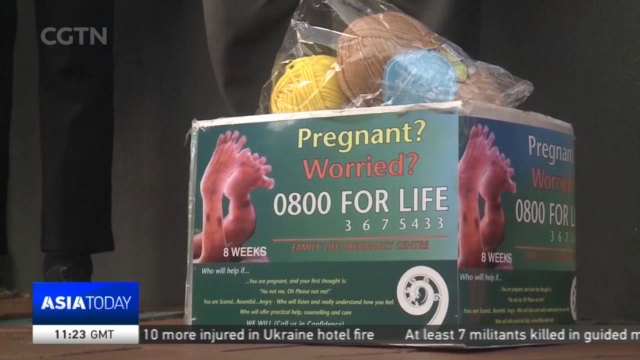
19:46, 17-Aug-2019
New Zealand Abortion Policy: Auckland proposes legislation to legalize abortion
Updated
19:59, 17-Aug-2019

New Zealand is moving to change its abortion laws by treating abortion as a health issue rather than a criminal offence. The proposed legislation will make it easier for women to terminate a pregnancy by choice rather than undergo a rigorous medical assessment. But pro-life supporters claim that decriminalization will lead to more abortions – especially in later stages of pregnancy. CGTN's Owen Poland has more.
Recent anti-abortion protests in Argentina, Ireland and America highlight a global issue that also affects New Zealand.
Jean Simpson has been praying outside one Auckland abortion clinic for 15 years
JEAN SIMPSON PRO-LIFE PROTESTER "We're praying for the mothers who are aborting their children, we're praying for the babies who are dying over there in that clinic."
Abortions are illegal in New Zealand unless they're officially approved, but the Government wants to make it a health issue – not a crime.
ANDREW LITTLE MINISTER OF JUSTICE "It is wrong that our present law characterizes a decision a women wishes to make about her own body and her reproductive choices as criminal."
But pro-life politician Simeon Brown is against new rules that make it easier to terminate pregnancies - after the critical 20-week period - on the grounds of a woman's mental health and wellbeing.
SIMEON BROWN NATIONAL PARTY MP "The current law says that it should be where the women's life is in danger and I think that's a far better balance in terms of the rights of the woman versus the rights of the child who is becoming viable at that point."
However many welcome the removal of legal barriers - which often delay abortions - and force women to lie about their medical condition.
PROFESSOR LIZ BEDDOE UNIVERSITY OF AUCKLAND "I think everyone agrees it'll be important for women to have support if they need it. To be able to go to a doctor and then access a service really quickly."
OWEN POLAND AUCKLAND "Because medical clinics like this one have been subjected to many anti-abortion demonstrations - the new legislation allows for the creation of 'safe zones' around clinics and hospitals which are designed to stop protestors coming within 150 metres of the buildings."
Simeon Brown says that safe zones could block the freedom to protest, but Liz Beddoe supports the idea.
PROFESSOR LIZ BEDDOE UNIVERSITY OF AUCKLAND "I know what it's like to face that harassment. When you're doing your job or using a legal health service, it's distressing, and it will be great to have that gone."
A parliamentary committee will now hear public views on the proposed abortion laws, and the Government expects strong opposition from people like Jean Simpson.
JEAN SIMPSON PRO-LIFE PROTESTER "As far as we're concerned it's killing a human being."
ANDREW LITTLE MINISTER OF JUSTICE "Some regard it as a denial of life or a breach of human rights. And we will hear extravagant language in the public debate about this referring to killings and murder. I reject those notions."
Owen Poland, CGTN, Auckland.
SITEMAP
Copyright © 2018 CGTN. Beijing ICP prepared NO.16065310-3
Copyright © 2018 CGTN. Beijing ICP prepared NO.16065310-3